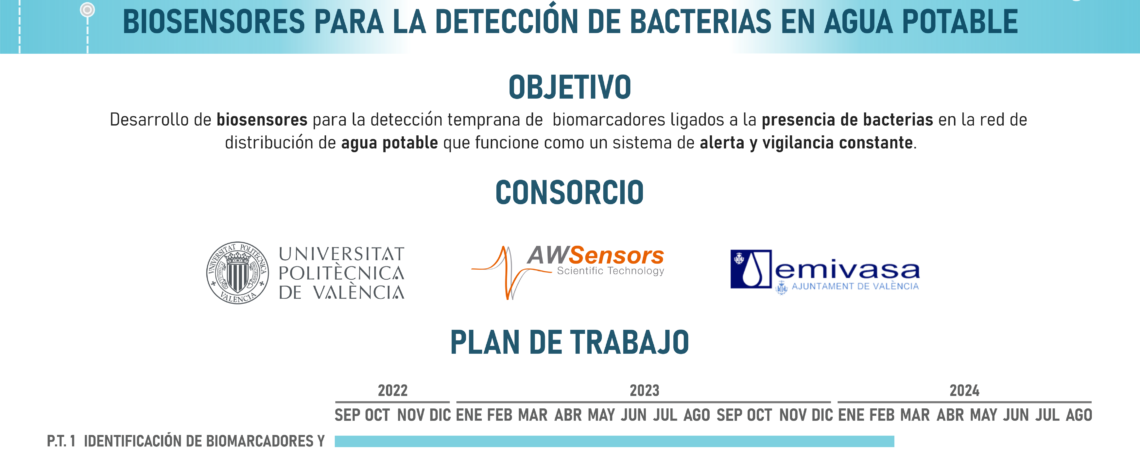Development of a biosensor technology for the detection of bacteria in drinking water.
Drinking water treatment and distribution systems are designed and operated to safeguard the hygienic quality and ensure the aesthetic quality of water from the point of raw water intake to the point of consumption. In this regard, monitoring is a non-negotiable and legislated requirement throughout the world. There is a recognized and accepted need to monitor, characterize and understand the overall microbiological performance/response of the various treatment stages, especially under changing environmental and operating conditions.
The monitoring of microbiology in drinking water represents a major common challenge in the integrated water cycle, as water quality analyses are typically performed through the collection of water samples at the network endpoint, followed by laboratory analyses, performed by traditional reference methods that are time consuming (14-20 days). These techniques are expensive and have important limitations: (i) measuring water quality only at the end point does not locate the source of contamination, (ii) culture methods take significant time to provide accurate results (by the time contamination is detected, thousands of people may already be affected), and (iii) there are contamination events that are very difficult to detect by methods that do not provide continuous information and real-time measurements.
Therefore, in the global market for quality control of drinking water distribution networks, there is a growing demand for highly sensitive, easy to use, reliable analytical techniques implemented in small and cost-effective devices, which optimally allow continuous and real-time detection. SensoBac aims to respond to this need by developing an early warning system that continuously detects increases in the presence of bacteria in the drinking water distribution network, allowing to address the problem as soon as possible.
The overall objective of Sensobac is to carry out the industrial research processes necessary for the development of a new biosensor analytical technique for the early detection of biomarkers (ATP, tryptophan, Tyrosine, NADH, ADP, etc.) linked to the presence of bacteria in the drinking water distribution network that functions as a constant alert and monitoring system. It is a reliable, simple, low-cost, highly sensitive technique that allows direct, in situ, continuous and real-time detection. Its operating principle is based on the novel HFF-QCM-ARRAY acoustic detection technology that integrates an array of 24 piezoelectric microsensors on a small substrate chip (typically 3-5 cm2). These microsensors can be independently functionalized to detect different analytes in the same sample.
The following specific objectives can be derived from the general objective above:
S.O. 1.- Identification and selection of generic biomarkers for the identification of viable bacteria in the drinking water distribution network.
S.O. 2.- Development of biochemical surface functionalization and acoustic detection methods suitable for HFF-QCM-ARRAY sensor technology that provide the necessary selectivity and sensitivity for the detection of the selected biomarkers.
S.O. 3.- Development of a robust CARTRIDGE solution that functions as an electrical, mechanical and thermal interface and provides the HFF-QCM microsensor chip with the necessary microfluidic capabilities to operate in the water distribution network.
S.O. 4.- Evolution of the HFF-QCM-ARRAY characterization technology for its adaptation to in-situ bacterial detection that requires continuous monitoring in remote environments. This evolution includes developments in hardware, software, mechanics and fluidics.
S.O. 5.- Validation of the demonstrator in real application environments.





